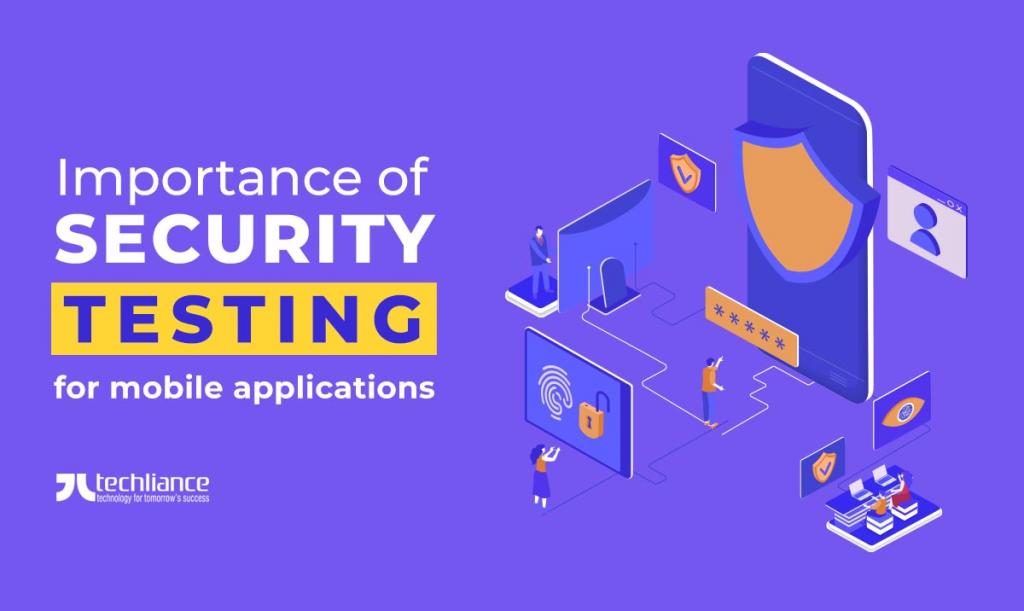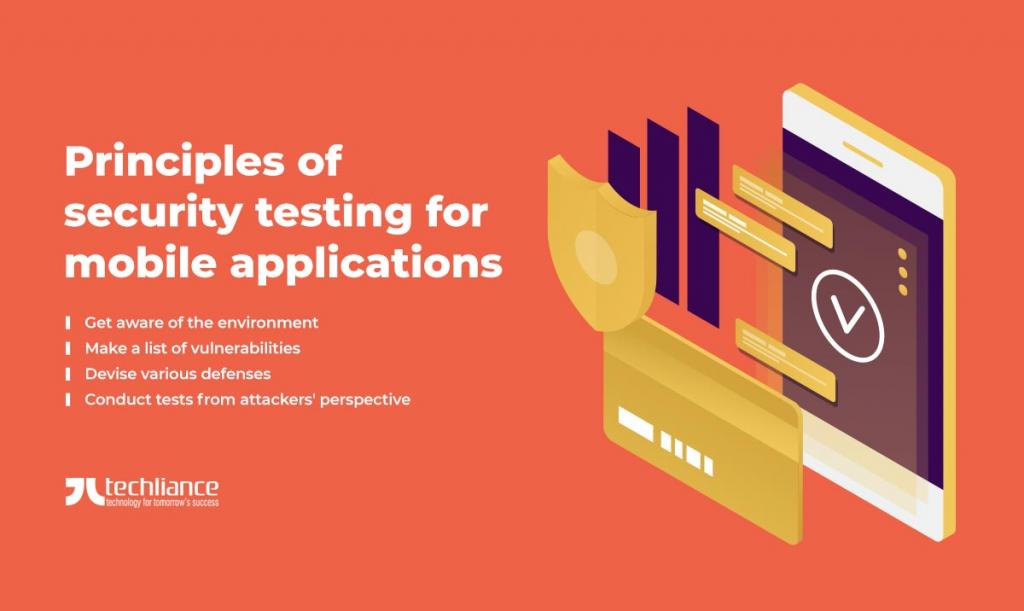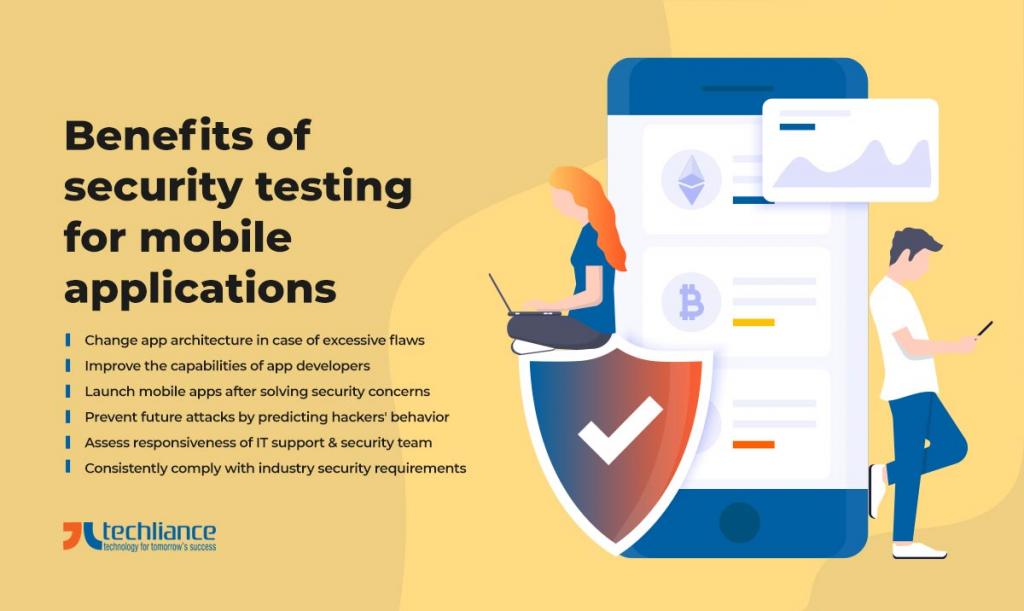Nowadays, people spend a lot of time on their mobile devices, whether for work, shopping, or communication. So, businesses must make security testing for mobile applications a priority. Globally and in the USA, users trust mobile apps that are secure and keep their data safe in 2024.
Today, smartphones have evolved into an extension of our lives. To the point where we use them to manage various types of sensitive data. For example, personal information, financial transactions, medical history, and passwords, etc.
However, the average users think that just password-protecting their mobile phones is sufficient protection. Even though this may still expose their critical data to theft. Security testing for mobile applications ensures that they are resistant to harmful user attacks.
Additionally, it warrants that professional dedicated developers comply with securing coding practices. It is essential to have a strong plan in place before doing effective security testing on mobile apps. Without a well-defined latter, the testing effort will be insufficient or may overlook security gaps.

Principles of security testing for mobile applications
The following are some critical principles to keep in mind while devising a plan for security testing for mobile applications.
- Get aware of the environment
- Make a list of vulnerabilities
- Devise various defenses
- Conduct tests from attackers’ perspective
Now, we briefly discuss these factors that play role in security testing for mobile applications during 2024.
Get aware of the environment
This is critical to recognize the platforms on which the application will run. Always create your apps for the stable versions of Android and the iOS platforms, while providing backward compatibility. The next phase is to learn the attack vectors that an attacker might use against such operating systems.
Make a list of vulnerabilities
Realize that vulnerability risks vary according to mobile applications. So, specific guidelines, as well as scale, must be considered during testing. It ensures that the application’s most vulnerable components are protected before release.

Devise various defenses
This entails using multiple methods of security testing for mobile applications. For instance, static, dynamic, and forensic analysis, etc. We may discover ways for an attacker to hack into the application if they are appropriately combined.
Conduct tests from attackers’ perspective
How can an attacker exploit our mobile applications? When we “hack” our mobile apps, we better understand their flaws. That’s why big companies involve ethical hackers and have bug bounty programs to safeguard their apps.
Benefits of security testing for mobile applications
- Change app architecture in case of excessive flaws
- Improve the capabilities of app developers
- Launch mobile apps after solving security concerns
- Prevent future attacks by predicting hackers’ behavior
- Assess responsiveness of IT support & security team
- Consistently comply with industry security requirements
Change app architecture in case of excessive flaws
Businesses and startups may face significant security breaches once the mobile application goes live without QA. You may uncover several security flaws during security testing for mobile applications. Thus, you can get aware of source code problems, attack vectors, bottlenecks, and security gaps before releasing the mobile application.
You may change the application architecture, app design, and code. Correcting issues in the production is easy than fixing when the live application has a flaw or a breach occurs. Also, the cost increases, because it includes technical problems and legal, public relations, and other costs at these phases.
Improve the capabilities of app developers
This is true that cybersecurity and application development are distinct disciplines. Nobody expects mobile application developers to be security specialists. The primary skill sets of developers include frontend/backend coding and creating the user experience.
They train to ensure that the application has all the necessary features and business functions. Primarily, developers are concerned with implementing the UI/UX, rather than with data security. They make sure to make mobile apps simple to use and attractive to look at.
However, you want to verify that the mobile app’s end-to-end delivery includes security measures. If the vendor doesn’t have the necessary security expertise in-house, they should partner with businesses that specialize in security. Application security is a necessary measure that all mobile application development companies must have and include in their applications.
Unfortunately, few do so due to the high cost of application security. If the company doesn’t identify security as necessary, it will implement it in a limited manner or not at all. You may analyze the vendor’s expertise by testing the security of their previously built apps.

Launch mobile apps after solving security concerns
Perform proper security testing for mobile applications before deploying to an IT environment. They must pass required technical and user acceptability testing to meet all technical and business criteria. These acceptance tests ensure that mobile apps are both user-friendly and maintainable by IT teams.
Along with fulfilling technical and user criteria, mobile applications must adhere to operational standards. This includes maintaining the production environment in its current state and avoiding security concerns. Experienced software engineers and security specialists recommend using a security-first strategy throughout the development process. Right from concept through design, build, go-live phases, and regular run and support activities.
Prevent future attacks by predicting hackers’ behavior
You have no way of knowing for certain whether or not cyberattackers would hack your mobile application. Similarly, you can’t be sure, that hackers will attack your backend systems, and steal your data. However, you can predict and minimize such future situations.
You can envisage hackers’ behavior to identify and repair code vulnerabilities before hackers exploit them. A penetration test is a subset of a security test that specifically intends for this purpose. That’s where software testing services employ sophisticated tools and an extensive understanding of information technology.
This way you can model the behavior of attackers that can penetrate the client’s environment. Also, you become aware of how they can get information anding access higher permissions without appropriate authorization. Thus, you can find ways to stop them from performing these harmful actions.
According to data security expert Bruce Schneider, testers may attempt to breach a network/application during a penetration test. Therefore, they can demonstrate their ability to simulate attacks and document flaws. During a penetration test, QA testers may simulate “remote attacks, physical data center penetration, or social engineering attacks”.
Assess responsiveness of IT support & security team
Remember to include security testing for mobile applications in the process of a mobile project. Accordingly, you can judge the response of your enterprise’s IT security team. Also, we may check the response’s timing, quality, and accuracy.
If the security team does not respond appropriately, there is an issue with the process. Alternatively, if you don’t have capabilities in-house then you can outsource IT assistance to a managed service provider. Correspondingly, we may test the service’s quality.
Consistently comply with industry security requirements
Presently, security testing is critical for ensuring the highest possible level of security in ICT environments. It requires FIPS 140-2 compliance, ISO 27001 certification, HIPAA compliance, and the OWASP methodology mandated by specific cyber security laws. For perfect mobile development, security testing for mobile applications is critical through 2024.
There is no reason why security could not be an essential part of the mobile app undertaking. With the rapid use of mobile technology by businesses, mobile application security testing is critical. Also, the frequency of mobile cyber breaches worldwide necessitates it in the United States and worldwide.

Conclusion
This is critical to have a comprehensive testing plan in place that covers all aspects of information security. It gives users trust that their data is secure. Additionally, it is essential to provide security advice to users.
Since they are also responsible for the data’s protection. While the application may be reliable and safe, the user is the last line of defense and always will be. App providers and users together can safeguard data against ever-increasing cybercrimes.
Do you want to develop and release a secure mobile app? Techliance can join hands with you to build a fully safe application for your business. Together we can protect your users from cyber breaches.




